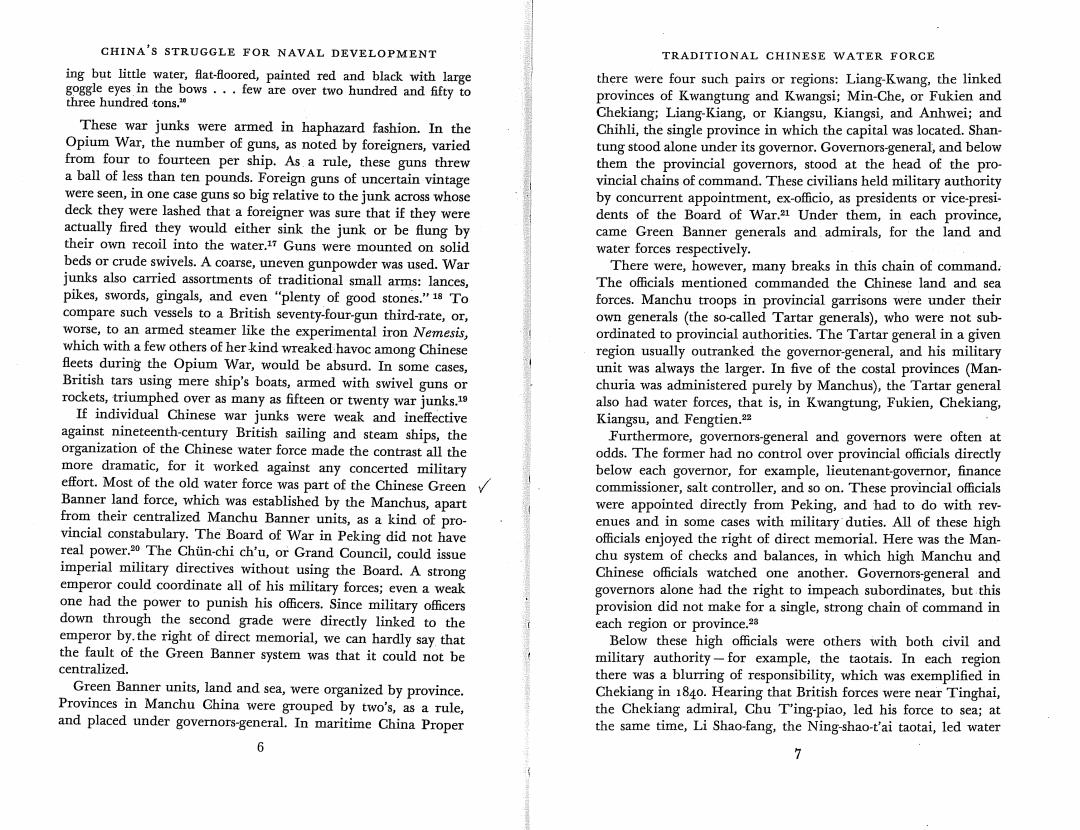正在加载图片...

CHINA'S STRUGGLE FOR NAVAL DEVELOPMENT TRADITIONAL CHINESE WATER FORCE ing but little water,fat-floored,painted red and black with large there were four such pairs or regions:Liang-Kwang,the linked goggle eyes in the bows...few are over two hundred and fifty to three hundred tons."0 provinces of Kwangtung and Kwangsi;Min-Che,or Fukien and Chekiang;Liang-Kiang,or Kiangsu,Kiangsi,and Anhwei;and These war junks were armed in haphazard fashion.In the Chihli,the single province in which the capital was located.Shan- Opium War,the number of guns,as noted by foreigners,varied tung stood alone under its governor.Governors-general,and below from four to fourteen per ship.As.a rule,these guns threw them the provincial governors,stood at the head of the pro- a ball of less than ten pounds.Foreign guns of uncertain vintage vincial chains of command.These civilians held military authority were seen,in one case guns so big relative to the junk across whose by concurrent appointment,ex-officio,as presidents or vice-presi- deck they were lashed that a foreigner was sure that if they were dents of the Board of War.21 Under them,in each province, actually fired they would either sink the junk or be flung by came Green Banner generals and admirals,for the land and their own recoil into the water.17 Guns were mounted on solid water forces respectively. beds or crude swivels.A coarse,uneven gunpowder was used.War There were,however,many breaks in this chain of command. junks also carried assortments of traditional small arms:lances, The officials mentioned commanded the Chinese land and sea pikes,swords,gingals,and even "plenty of good stones."is To forces.Manchu troops in provincial garrisons were under their compare such vessels to a British seventy-four-gun third-rate,or, own generals(the so-called Tartar generals),who were not sub- worse,to an armed steamer like the experimental iron Nemesis, ordinated to provincial authorities.The Tartar general in a given which with a few others of her kind wreaked havoc among Chinese region usually outranked the governor-general,and his military fleets during the Opium War,would be absurd.In some cases, unit was always the larger.In five of the costal provinces (Man- British tars using mere ship's boats,armed with swivel guns or churia was administered purely by Manchus),the Tartar general rockets,triumphed over as many as fifteen or twenty war junks.19 also had water forces,that is,in Kwangtung,Fukien,Chekiang, If individual Chinese war junks were weak and ineffective Kiangsu,and Fengtien.22 against nineteenth-century British sailing and steam ships,the Furthermore,governors-general and governors were often at organization of the Chinese water force made the contrast all the odds.The former had no control over provincial officials directly more dramatic,for it worked against any concerted military below each governor,for example,lieutenant-governor,finance effort.Most of the old water force was part of the Chinese Green commissioner,salt controller,and so on.These provincial officials Banner land force,which was established by the Manchus,apart were appointed directly from Peking,and had to do with rev- from their centralized Manchu Banner units,as a kind of pro- enues and in some cases with military duties.All of these high vincial constabulary.The Board of War in Peking did not have officials enjoyed the right of direct memorial.Here was the Man- real power.20 The Chuin-chi ch'u,or Grand Council,could issue chu system of checks and balances,in which high Manchu and imperial military directives without using the Board.A strong Chinese officials watched one another.Governors-general and emperor could coordinate all of his military forces;even a weak governors alone had the right to impeach subordinates,but this one had the power to punish his officers.Since military officers provision did not make for a single,strong chain of command in down through the second grade were directly linked to the each region or province.28 emperor by.the right of direct memorial,we can hardly say that Below these high officials were others with both civil and the fault of the Green Banner system was that it could not be military authority-for example,the taotais.In each region centralized. there was a blurring of responsibility,which was exemplified in Green Banner units,land and sea,were organized by province. Chekiang in 1840.Hearing that British forces were near Tinghai, Provinces in Manchu China were grouped by two's,as a rule, the Chekiang admiral,Chu Ting-piao,led his force to sea;at and placed under governors-general.In maritime China Proper the same time,Li Shao-fang,the Ning-shao-t'ai taotai,led water 6 7